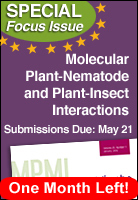|
MPMI's Editor's Pick
Dr. Gary Stacey, Editor-in-Chief
 A Zinc-Finger-Family Transcription Factor A Zinc-Finger-Family Transcription Factor
Cell wall degrading enzymes are generally thought to play an important role in both fungal and bacterial pathogenicity. However, functional redundancy among the genes encoding these enzymes has made it very difficult to confirm their role genetically. In the April issue of MPMI, Srivastava et al. show that mutations in the transcription factor, Abvf19, significantly reduced virulence of Alternaria brassicicola. Of the 74 genes apparently regulated by Abvf19, 24 encode cell wall degrading enzymes. Read more... |
APRIL's MOST READ PAPER
XopR, a Type III Effector Secreted by Xanthomonas oryzae pv. oryzae, Suppresses Microbe-Associated Molecular Pattern-Triggered Immunity in Arabidopsis thaliana
Chiharu Akimoto-Tomiyama, Ayako Furutani, Seiji Tsuge, Erica J. Washington, Yoko Nishizawa, Eiichi Minami, and Hirokazu Ochiai
 Xanthomonas oryzae pv. oryzae is the causal agent of bacterial blight of rice. The XopR protein, secreted into plant cells through the type III secretion apparatus, is widely conserved in xanthomonads and is predicted to play important roles in bacterial pathogenicity. Here, we examined the function of XopR by constructing transgenic Arabidopsis thaliana plants expressing it under control of the dexamethasone (DEX)-inducible promoter. Collectively, these results suggest that XopR inhibits basal defense responses in plants rapidly after MAMP recognition. Read more... Xanthomonas oryzae pv. oryzae is the causal agent of bacterial blight of rice. The XopR protein, secreted into plant cells through the type III secretion apparatus, is widely conserved in xanthomonads and is predicted to play important roles in bacterial pathogenicity. Here, we examined the function of XopR by constructing transgenic Arabidopsis thaliana plants expressing it under control of the dexamethasone (DEX)-inducible promoter. Collectively, these results suggest that XopR inhibits basal defense responses in plants rapidly after MAMP recognition. Read more...
|
|
Call for Papers - Special MPMI Focus Issue!
Molecular Plant-Nematode and Plant-Insect Interactions
Special Guest Editors: Dr. Geert Smant, Dr. Saskia Hogenhout,
Dr. Melissa G. Mitchum
 Molecular Plant-Microbe Interactions Molecular Plant-Microbe Interactions invites original research manuscripts on the molecular biology and molecular genetics/genomics of parasitic interactions of nematodes and insects with plants for a special 2012 issue. This special issue will bring added attention to critically important research that has shown significant progress in recent years. Three mini-reviews written by key scientists in the field will cover 1) nematode salivary proteins/effectors, 2) aphid salivary proteins/effectors, and 3) nematode-induced feeding structures. Click here for more information on publishing your research in the MPMI Focus Issue |